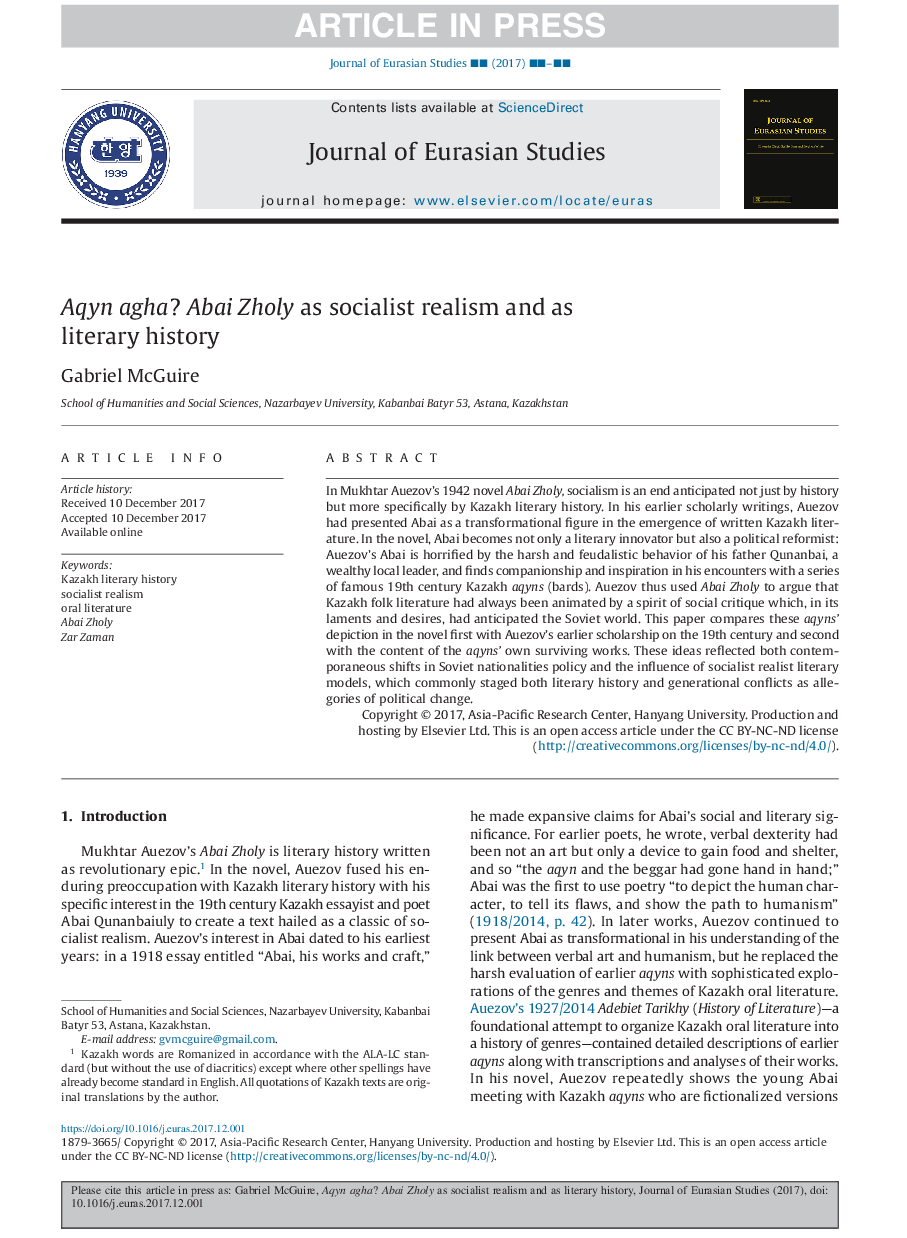| کد مقاله | کد نشریه | سال انتشار | مقاله انگلیسی | نسخه تمام متن |
|---|---|---|---|---|
| 7537614 | 1488700 | 2018 | 10 صفحه PDF | دانلود رایگان |
عنوان انگلیسی مقاله ISI
Aqyn agha? Abai Zholy as socialist realism and as literary history
ترجمه فارسی عنوان
آقین آقا؟ ابایی زولو به عنوان رئالیسم سوسیالیست و به عنوان تاریخ ادبیات
دانلود مقاله + سفارش ترجمه
دانلود مقاله ISI انگلیسی
رایگان برای ایرانیان
کلمات کلیدی
تاریخ ادبیات قزاقستان، رئالیسم سوسیالیستی، ادبیات شفاهی، ابایی زولای، زرنجان،
ترجمه چکیده
در رمان "ابعاد زولو" در سال 1942 "مختار آوزوف"، سوسیالیسم نه تنها به تاریخ، بلکه به طور خاص به تاریخ ادبیات قزاقستان نیز منتهی می شود. اوزوف در آثار نویسندگان قبلی خود، ابای را به عنوان یک شکل تحول آمیز در ظهور ادبیات نوشته شده در قزاقستان معرفی کرده است. در رمان، ابایی نه تنها یک نوآور ادبی بلکه یک اصلاح طلبان سیاسی نیز می شود: ابای احزاب از رفتار خشن و فئودالی پدرش، قننبی، یک رهبر محلی ثروتمند، و همراهی و الهام در روابط او با مجموعه ای از معروف قزاقهای قرن نوزدهم (برد). از این رو اوزوف از ابوظل زولی برای استدلال بر این بود که ادبیات قومی قزاق توسط روح نقد اجتماعی متحول شده است که در خلال اعترافات و خواسته های خود، جهان شوروی را پیش بینی کرده است. در این مقاله ابتدا این آگینها را در رمان با آثار پیشین آئوزوف در قرن نوزدهم و دوم با محتوای آثار باقیمانده آقینان مقایسه می کنیم. این ایده ها منعکس کننده تغییرات همزمان در سیاست های ملی ملی شوروی و تأثیر مدل های ادبی سوسیالیستی ادبی بود که معمولا تاریخ ادبی و درگیری های نسلی را به عنوان تمثیل های سیاسی تغییر داد.
موضوعات مرتبط
علوم انسانی و اجتماعی
علوم انسانی و هنر
هنر و علوم انسانی (عمومی)
چکیده انگلیسی
In Mukhtar Auezov's 1942 novel Abai Zholy, socialism is an end anticipated not just by history but more specifically by Kazakh literary history. In his earlier scholarly writings, Auezov had presented Abai as a transformational figure in the emergence of written Kazakh literature. In the novel, Abai becomes not only a literary innovator but also a political reformist: Auezov's Abai is horrified by the harsh and feudalistic behavior of his father Qunanbai, a wealthy local leader, and finds companionship and inspiration in his encounters with a series of famous 19th century Kazakh aqyns (bards). Auezov thus used Abai Zholy to argue that Kazakh folk literature had always been animated by a spirit of social critique which, in its laments and desires, had anticipated the Soviet world. This paper compares these aqyns' depiction in the novel first with Auezov's earlier scholarship on the 19th century and second with the content of the aqyns' own surviving works. These ideas reflected both contemporaneous shifts in Soviet nationalities policy and the influence of socialist realist literary models, which commonly staged both literary history and generational conflicts as allegories of political change.
ناشر
Database: Elsevier - ScienceDirect (ساینس دایرکت)
Journal: Journal of Eurasian Studies - Volume 9, Issue 1, January 2018, Pages 2-11
Journal: Journal of Eurasian Studies - Volume 9, Issue 1, January 2018, Pages 2-11
نویسندگان
Gabriel McGuire,
